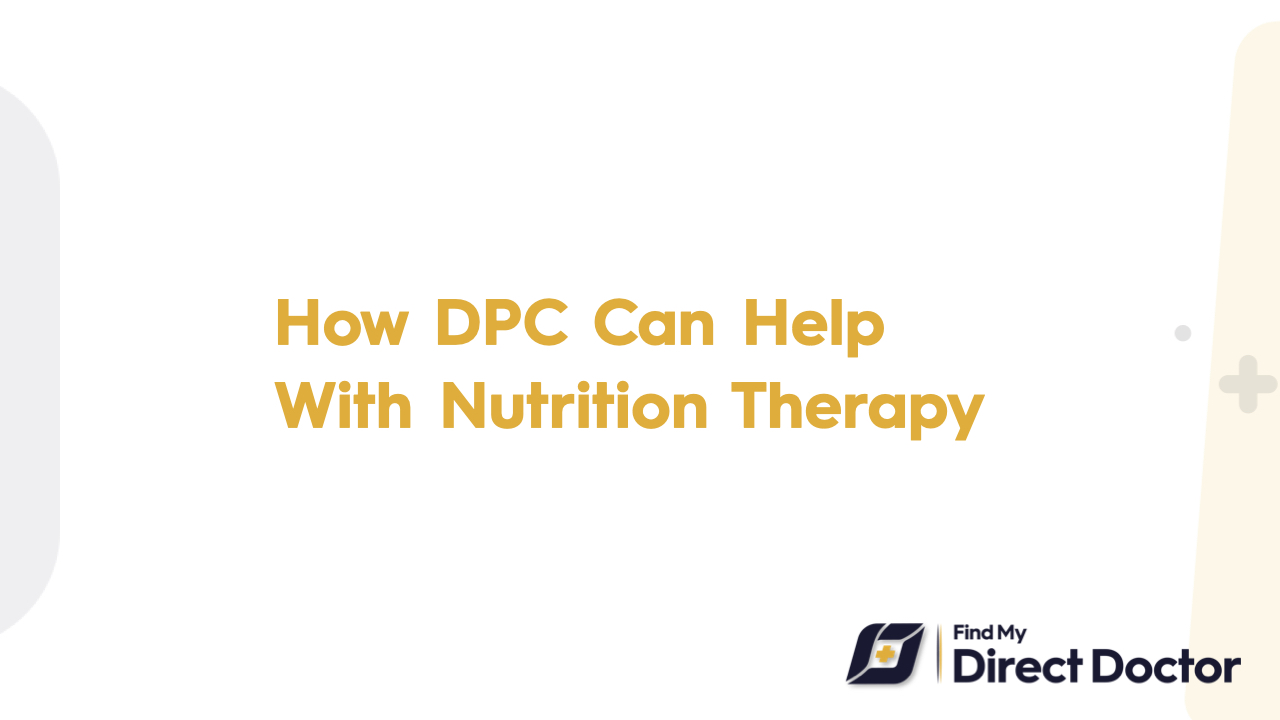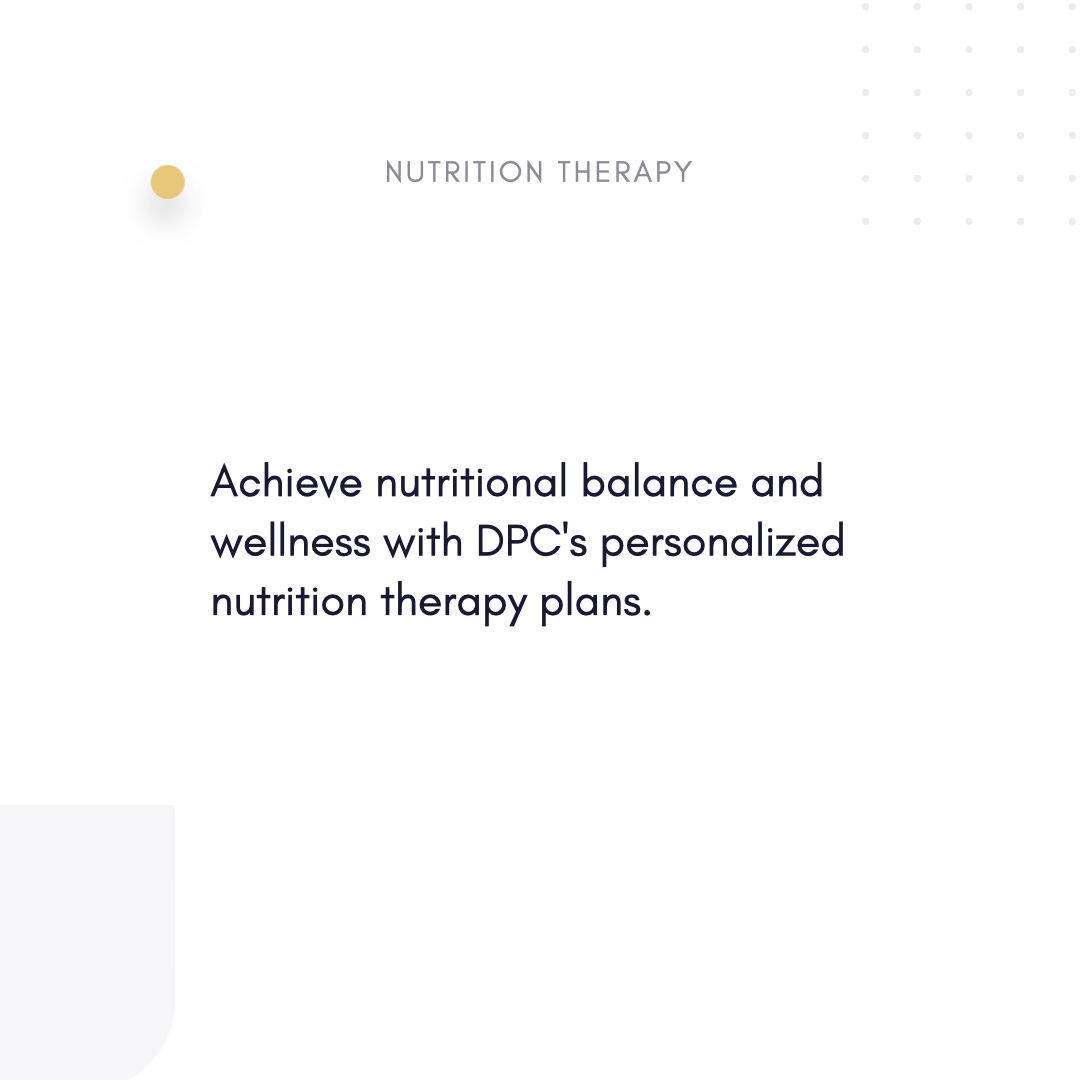Nutrition Therapy and Direct Primary Care (DPC): Personalized Dietary Solutions, Sustained Wellness
If you have chronic health problems like diabetes, obesity, or heart disease, nutrition therapy can help you take charge of your health. DPC makes sure that the changes you make to your diet are long-lasting, based on science, and fit your life.

Learning about nutrition therapy: how to eat to stay healthy
Nutrition therapy employs evidence-based dietary approaches to regulate medical conditions, enhance metabolic health, and avert disease progression. Some common uses are:
- Diabetes: Plans for counting carbs and checking blood sugar levels.
- Cardiovascular disease: Diets low in sodium and high in fiber can help lower blood pressure.
- Obesity: Meal plans that limit calories and coaching to change behavior.
Important facts:
- Uses: Treats long-term illnesses, nutrient shortages, or risks related to being overweight.
- Safety: Non-invasive and designed to avoid food allergies or interactions.
- Costs: DPC memberships (75–200 USD/month) usually include visits with a nutritionist, while traditional fees (100–300 USD/session) do not.
Risks of not treating problems:
- A1c getting worse, heart disease getting worse, and quality of life getting worse.
How DPC Improves the Results of Nutrition Therapy
Direct Primary Care (DPC) changes nutrition therapy by combining medical knowledge with personalized, unhurried help.
Thorough Evaluation and Planning
- Tools for diagnosis: Blood tests (like lipid panels and glucose levels) and validated questionnaires to find gaps in your diet.
- Designing together: Primary care doctors and registered dietitians make meal plans that take into account medications, cultural preferences, and lifestyle.
- Review of medications: Change prescriptions (like insulin) to go along with changes in diet.
Costs that are clear and access that is always available
- Care that covers everything: With a membership, you can have as many consultations as you want, access to an RDN, and keep track of your progress.
- Saving money: Self-pay DPC models help you avoid paying 40–60% more than regular dietitian fees.
- Other ways to do things: Talk about supplements, intermittent fasting, or specialized diets (like the Mediterranean or DASH diets) as needed.
Progress that lasts and the ability to change
- Check-ins every week: Change your plans if you have cravings, your budget changes, or your progress stops.
- Focus on prevention: Use integrated coaching to deal with the root causes of things like stress or lack of sleep.
- Monitoring for a long time: Keep an eye on biomarkers like cholesterol and BMI to stop relapse.
Success Stories from Real Life
- Case 1: Linda, 58 years old, has type 2 diabetes. Linda's DPC team made a meal plan with low glycemic index foods. This brought her A1c down from 8.5% to 6.2% in six months.
- Case 2: Carlos, 45, has high blood pressure. Carlos's DPC RDN put him on a heart-healthy diet, which let him stop taking two blood pressure medicines.
Questions and Answers: DPC Nutrition Therapy
- Q: When will I see results?
- A: Changes in metabolism (like lower glucose levels) will happen in 3–6 months, and energy levels will improve in 2–4 weeks.
- Q: Do the plans include meals for the whole family?
- A: Yes, DPC makes plans that work for families.
- Q: What if I make a mistake?
- A: DPC helps people change their habits without making them feel bad about it.
- Q: Can therapy help with food allergies?
- A: Yes, RDNs make plans that don't include allergens and suggest alternatives.
Why DPC Excels in Dietary Management
The Academy of Nutrition and Dietetics stresses the importance of individualized care for dietary success. DPC gets things done by:
- Cutting down on wait times: 80% of patients start nutrition plans within a week instead of the usual four or more weeks.
- Increasing adherence: Regular follow-ups raise compliance by 50%.
- Cutting costs: By using bundled services, members save between 600 USD and 1,500 USD a year.
Final Thoughts
Nutrition therapy in DPC isn't just about diets; it's about building trust, using science, and getting help to improve your health for good. With DPC, you get a team that keeps an eye on your progress, helps you get over setbacks, and celebrates your wins. No waiting for insurance, no generic advice—just a clear path to a healthier, happier life.






